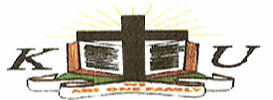LENTEN CAMPAIGN WEEK 3
Natural Resource Management
See: Story
Madini was a village blessed with various natural resources, which included lakes, rivers, forests, oil, coal, sand, gold and other precious stones. The discovery of some of these resources attracted both local and foreign investors whose particular interest was in the communities with these vast resources. The intrusion by investors caused the Madini community untold miseries and changed their social set-up. The villagers had no prior information about the intended activities and their effects, both negative and positive. The peoples’ interests and welfare were not considered for lack of community participation. Exploration activities caused water contamination, and air, soil and noise pollution. Families were disintegrated as men abandoned their homes to work at the mines. Various strange
diseases became common among ommunity members.
The situation became unbearable and the community consulted their elected leaders, who were also divided as some of them backed the investors, causing the community more grief and agony. The villagers, sought the help of their religious leaders who organised a meeting that brought together all stakeholders.
The revelations by community leaders of the plight of the villagers troubled the authorities as they were unaware of the extent of the damage caused by the exploration and mining activities. All these activities were suspended until there was full compliance with all relevant policies, public participation requirements, and adherence to the regulatory and legal structures.
Judge: Situation analysis
Kenya is a rich country blessed with vast mineral resources. Despite the anticipated benefits from this natural wealth, the country, and especially the communities where resources are found, lags behind in development as multinationals and other organisations reap benefits.
Minerals have turned out to be more of a curse in some regions of Africa than a blessing. Negligence in operations, production and processing of minerals have led to untold environmental pollution, degradation, poverty, diseases and deaths. This is mostly due to lack of knowledge among members of the affected communities, and laxity in compliance and enforcement of laws, regulations and international best practices.
In Kenya, exploration of natural resources is an emerging area of production with massive potential and possible major impact on the country’s economy. This potential is, however, hampered by lack of quality and easily accessible geological data, and technical, institutional and financial capacity. Challenges which need to be addressed include:
18
- Resettlement and compensation of the affected community members;
- Fostering of transparency, accountability (public disclosure of contracts and the
contracting process) and public participation;
- Prudent use and management of revenues/royalties by the national and county governments, and communities, and;
- Management of the primary resource i.e. what structures, frameworks and institutions
to manage the resources and all resultant benefits.
From the foregoing, the Church is called upon to participate in addressing the historical injustices in the exploitation of natural resources. In fulfilling its prophetic mandate, it should:
- Stand in solidarity with communities that are impacted by these realities;
- Be vigilant to ensure these challenges do not affect the communities negatively, and;
- Engage with parties whose actions/decisions affect the lives of people.
The Catholic Church has developed an Extractive Industry Engagement Framework to guide on the Church in Kenya on how it can actively and meaningfully engage for the common good.
Readings
Exodus 17:1-7
Romans 5:1-11
John 4:5-12
Spiritual reflection
Today, the Church, in an effort to renew a sensitivity and respect among us, puts before us for our reflection, the scriptural motive of water. In both the first reading and the Gospel, water is presented as a gift, a necessity for life, a gift that God, who alone is the source of life, can give.
With water in the wilderness, God sustained the people he had called forth from slavery, blessed with freedom and graced with an abiding relationship (covenant) with himself. The master and creator of the universe, who made the “waters above” and the “waters below” (Genesis 1:7), Yahweh was also the keeper and creator of the history of his people. For Israel, water became a symbol of Yahweh’s constant care and attentive presence. Israel had only to believe to have their every thirst slaked by Him (Exodus 17: 1–7).
Paul, in his letter to the Romans, described the saving water of God’s love as a gift poured out into the hearts of powerless but believing sinners. In the Gospel, Jesus’ exchange with the woman at the well awakened in her a thirst for the wholeness and integrity she had lost and which he had come to satisfy. Her joy was contagious and instilled in others a similar thirst for the living water he offered and continues to offer to all who believe.
19
Water here represents mother earth. We must appreciate all the resources we have been given by God and use them for His glory. This means that we are being called to be stewards of the wealth we have been given. Natural resources are a gift and must be treated as such.
Act: Reflection questions
- What are some of the natural resources in your community?
- How have I been involved in resource destruction?
- In the process of utilisation, what are the available sustainable measures?
Examination of conscience
- How have I been involved in resource utilisation, e.g. water and anything else I am entrusted with?
- Have I participated in matters on mining of other natural resources?
Proposed action
- To familiarise with the Catholic Church Extractive Engagement Framework.
- Consistent tree planting, rehabilitation and restoration of forests.
- Train the public on their rights on matters resources.

